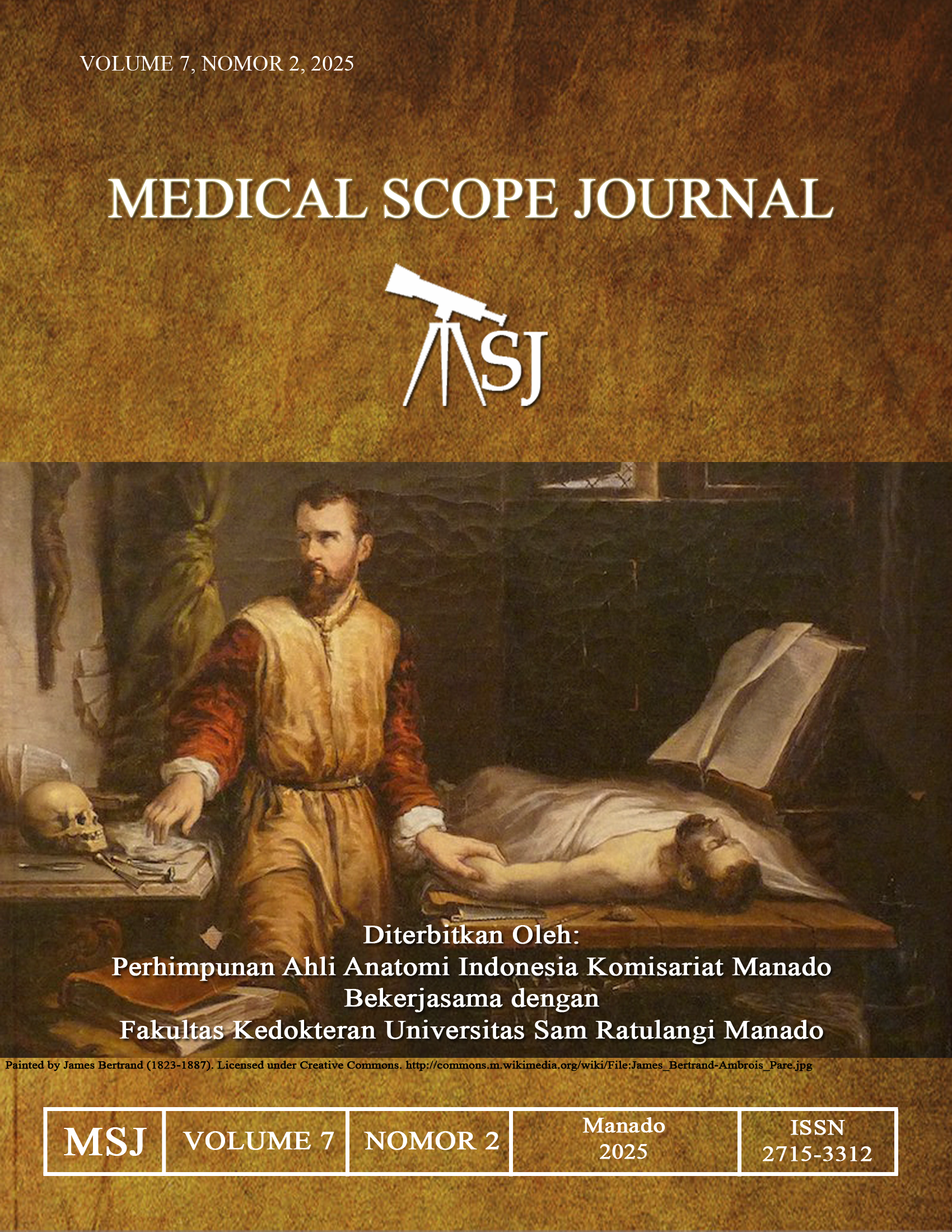Hubungan Metakognisi dengan Indeks Prestasi Kumulatif (IPK) Pada Mahasiswa Program Studi Pendidikan Dokter
DOI:
https://doi.org/10.35790/msj.v7i2.60784Abstract
Abstract: Grade Point Average (GPA) is an evaluation parameter of student learning outcomes at university, and can be influenced by many factors, one of which is metacognition. Metacognition helps a person become lifelong learners who are independent in learning and able to adapt to the development of science. This study aimed to determine the relationship between metacognition and GPA of medical students of batch 2022 in Universitas Sam Ratulangi. This was a quantitative study with an observational and analytical approach, and designed with a cross-sectional model. Samples were medical students batch 2022 of Universitas Sam Ratulangi, as many as 211 students who met the inclusion criteria. Students' metacognition was measured using the Metacognitive Awareness Inventory (MAI) questionnaire, and GPA data obtained through the students’ transcripts. The results showed that respondents with very good metacognition (12.3%), good (34.1%), enough (52.6%), dan low (0,9%). Respondents’ GPA divided into praised (79,1%), very satisfactory (19,9%), satisfactory (0.5%), and unsatisfactory (0.5%). The Fisher’s Exact Test analysis obtained a p-value of 0.388 (p>0.05). In conclusion, there is not significant relationship between metacognition and GPA of medical students batch 2022 in Universitas Sam Ratulangi.
Keywords: metacognition; grade point average; metacognitive awareness inventory
Abstrak: Indeks Prestasi Kumulatif (IPK) merupakan suatu parameter evaluasi hasil belajar mahasiswa pada tingkat pendidikan tinggi, yang dapat dipengaruhi oleh banyak faktor, salah satunya ialah metakognisi. Metakognisi membantu seseorang menjadi lifelong learner yang mandiri dalam belajar dan mampu beradaptasi terhadap perkembangan ilmu pengetahuan. Penelitian ini bertujuan untuk mengetahui hubungan antara metakognisi dengan IPK pada mahasiswa angkatan 2022 Fakultas Kedokteran Universitas Sam Ratulangi. Jenis penelitian ialah kuantitatif dengan pendekatan observasional analitik, dan desain potong lintang. Sampel penelitian ialah mahasiswa angkatan 2022 Program Studi Pendidikan Dokter Fakultas Kedokteran Universitas Sam Ratulangi berjumlah 211 orang yang memenuhi kriteria inklusi. Metakognisi mahasiswa diukur dengan menggunakan kuesioner Metacognitive Awareness Inventory (MAI) dan data IPK didapatkan melalui transkrip nilai mahasiswa. Hasil penelitian mendapatkan responden memiliki metakognisi sangat baik (12,3%), baik (34,1%), cukup (52,6%), dan rendah (0,9%). IPK responden terbagi menjadi pujian (79,1%), sangat memuaskan (19,9%), memuaskan (0,5%), dan kurang memuaskan (0,5%). Hasil analisis Fisher’s Exact Test mendapatkan nilai p=0,388 (p> 0,05). Simpulan penelitian ini ialah idak terdapat hubungan antara metakognisi dengan IPK pada mahasiswa angkatan 2022 Program Studi Pendidikan Dokter Fakultas Kedokteran Universitas Sam Ratulangi.
Kata kunci: metakognisi; indeks prestasi kumulatif; metacognitive awareness inventory
References
Udil PA, Kadi S, Ekowati CK. Pengaruh kemampuan metakognitif terhadap indeks prestasi kumulatif mahasiswa pendidikan matematika UNDANA. Jurnal Matematika dan Pendidikan Matematika [Internet]. 2022;3(1):89-96. Available from: https://ejurnal.undana.ac.id/index.php/fraktal/article/ download/7225/3747
Chandra IRA, Tjhin P. Hubungan keterampilan berpikir kritis (metakognitif) dengan indeks prestasi kumulatif pada mahasiswa Fakultas Kedokteran. Jurnal Biomedika dan Kesehatan. 2019;2(2):51–7. Doi: http://dx.doi.org/10.18051/JBiomedKes.2019.v2.51-57
Hakam M, Sudarno, Hoyyi A. Analisis jalur terhadap faktor-faktor yang mempengaruhi indeks prestasi kumulatif (IPK) mahasiswa statistika Undip. Jurnal Gaussian [Internet]. 2015;4(1):61–70. Available from: https://ejournal3.undip.ac.id/index.php/gaussian/article/view/8146
Çetin B. Factors affecting the general academic achievement of university students: gender, study hours, academic motivation, metacognition and self-regulated learning. Inquiry in Education. 2021;13(2):1–14. Available from: https://digitalcommons.nl.edu/ie/vol13/iss2/12/
Mirzaei F, Phang FA, Sulaiman S, Ismail Z. Mastery goals, performance goals, students’ beliefs and academic success: metacognition as a mediator. Procedia Social and Behavior Sciences. 2012;46(1):3603–8. Doi: http://dx.doi.org/10.1016/j.sbspro.2012.06.113
Quirk M. Intuition and Metacognition in Medical Education: Key to Developing Expertise [Internet]. Fostering Learning in Small Groups: A Practical Guide. New York; 2006. Available from: https://books.google.co.ck/books?id=Vb5bAAAAQBAJ&printsec=frontcover&rview=1#v=onepage&q&f=false
Gonullu I, Artar M. Metacognition in medical education. Education for Health. 2014;27(2):225–6. Available from: https://journals.lww.com/edhe/fulltext/2014/27020/ metacognition_in_medical_education.24.aspx
Ward RT, Butler DL Gonullu I, Artar M. Metacognition in Medical Education. Education for Health: Change in Learning and Practice. An investigation of metacognitive awareness and academic performance in college freshmen. Education (Chula Vista). 2019;139(3):120–6. Available from: https://www.researchgate.net/publication/331644837_An_investigation_of_metacognitive_awareness_and_academic_performance_in_college_freshmen
Wulandari BA, Ridha A, Fortunasari. English undergraduate students and their metacognitive awareness level: evidence from one English Education Program How to Cite. Indonesian Research Journal in Education. 2022;6(1):168–79. Available from: https://online-journal.unja.ac.id/irje/article/view/24627
Schraw G, Dennison RS. Assessing metacognitive awareness. Contemporary Education Psychology. 1994;19:460–75. Doi: https://psycnet.apa.org/doi/10.1006/ceps.1994.1033
Young A, Fry JD. Metacognitive awareness and academic achievement in college students. Journal of the Scholarship of Teaching and Learning. 2008;8(2):1-10. Available from: https://files.eric.ed.gov/ fulltext/EJ854832.pdf
Anggresta V. Analisis faktor-faktor yang mempengaruhi prestasi belajar mahasiswa Fakultas Ekonomi Universitas Negeri Padang. Journal of Economic and Economic Education. 2016;4(1):19–29. Doi: https://dx.doi.org/10.22202/economica.2015.v4.i1.325
Yusuf FA, Maliki BI. Psikologi Pendidikan (1st ed). Monalisa, editor. Depok: Rajawali Press; 2022.
Lisiswanti R, Sanusi R, Prihatiningsih TS. Hubungan motivasi dan hasil belajar mahasiswa kedokteran. Jurnal Pendidikan Kedokteran Indonesia. 2015;4(1):1–6. Doi: https://doi.org/10.22146/jpki.25259
Mandang JH. Hubungan tingkat IQ dengan motivasi mahasiswa FiPP Unima. Jurnal Ilmiah Wahana Pendidikan. 2023;9(6):678–86. Doi: https://doi.org/10.5281/zenodo.8084207
Khosuma A, Wariki WM V, Manoppo FP. Hubungan nilai Intelligence Quotient dengan indeks prestasi kumulatif semester satu sampai enam mahasiswa angkatan 2015 Fakultas Kedokteran Universitas Sam Ratulangi. Jurnal Medik dan Rehabilitasi (JMR). 2018;1(2):1-8. Available from: https://ejournal.unsrat.ac.id/v3/index.php/jmr/article/view/22309/21993
Reteng P, Wungouw HIS, Polii H. Nilai Intelligence Quotient (IQ) dan nilai ujian modul mahasiswa angkatan 2013 Fakultas Kedokteran Universitas Sam Ratulangi. eBiomedik. 2014;2(1). Available from: https://ejournal.unsrat.ac.id/v3/index.php/ebiomedik/article/view/3644/3170
Downloads
Published
How to Cite
Issue
Section
License
Copyright (c) 2025 Agnes M. Silalahi, Damajanty H. C. Pangemanan, Elvin C. Angmalisang

This work is licensed under a Creative Commons Attribution-NonCommercial 4.0 International License.
COPYRIGHT
Authors who publish with this journal agree to the following terms:
Authors hold their copyright and grant this journal the privilege of first publication, with the work simultaneously licensed under a Creative Commons Attribution License that permits others to impart the work with an acknowledgment of the work's origin and initial publication by this journal.
Authors can enter into separate or additional contractual arrangements for the non-exclusive distribution of the journal's published version of the work (for example, post it to an institutional repository or publish it in a book), with an acknowledgment of its underlying publication in this journal.
Authors are permitted and encouraged to post their work online (for example, in institutional repositories or on their website) as it can lead to productive exchanges, as well as earlier and greater citation of the published work (See The Effect of Open Access).










